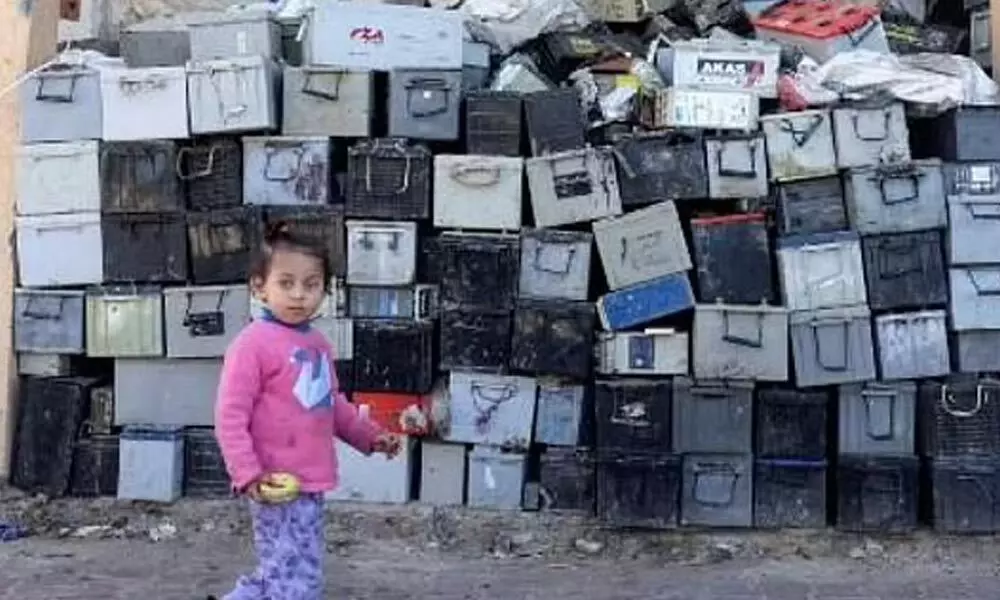Live
- Over 7,600 Syrians return from Turkiye in five days after Assad's downfall: minister
- Delhi BJP leaders stay overnight in 1,194 slum clusters
- Keerthy Suresh and Anthony Thattil Tie the Knot in a Christian Ceremony
- AAP, BJP making false promises to slum dwellers for votes: Delhi Congress
- 'Vere Level Office' Review: A Refreshing Take on Corporate Life with Humor and Heart
- Libya's oil company declares force majeure at key refinery following clashes
- Illegal Rohingyas: BJP seeks Assembly session to implement NRC in Delhi
- Philippines orders full evacuation amid possible volcanic re-eruption
- Government Prioritizes Welfare of the Poor, says Dola Sri Bala Veeranjaneyaswamy
- Two Russian oil tankers with 29 on board damaged due to bad weather
Just In

Mounds of old batteries threaten Gaza health
Batteries are an essential power source in Gaza, where public electricity supply is sparse and infrastructure has decayed since an Israeli blockade of the enclave began in 2007.
GAZA CITY: At a landfill in southern Gaza, mounds of discarded batteries pile up, rusting cells that pose a growing health risk to Palestinians in the enclave.
Batteries are an essential power source in Gaza, where public electricity supply is sparse and infrastructure has decayed since an Israeli blockade of the enclave began in 2007, the year Hamas Islamists seized control.
"The batteries have been piling up for 15 years," said Ibrahim Baraka, who works at the 2,000 square metre (half an acre) landfill in Khan Yunis, where residents of surrounding houses can peer in to see piles of lead and mercury waste accumulating daily.
Gaza, home to 2.3 million Palestinians, has only one power plant that runs on diesel. Fuel deliveries are unreliable, largely due to the blockade. The plant was also bombed by Israeli fighter jets during a 2006 conflict with Hamas.
Mohamed Masleh, director of resources at Gaza's Environment Ministry, estimated that there are 25,000 tonnes of used batteries in Gaza that need to be recycled.
Most are at sites not suited for storing dangerous materials.
A dangerous 'farce'
Battery collection is also a source of income for the impoverished territory, where unemployment rates hover around 50 percent.
On a crisp morning, Zakaria Abu Sultan meandered his horse-drawn cart through the streets of Gaza City, shouting his mission through a loudspeaker.
"Anyone with damaged batteries to sell?" he called out.
"I've been wandering since dawn to buy damaged batteries. I buy them at best for 50 shekels ($15), and sell them to the scrap dealer for 70 shekels," he told AFP.
Typically, damaged cells are taken to landfills, like the one in Khan Yunis where Baraka works, which dismantle them for materials like plastic that are then sold to factories.
Ahmed Hillis, director of Gaza's National Institute for Environment and Development, said that while he understood there was profit in discarded batteries, the trade was extremely dangerous.
"Tonnes of batteries are accumulating in dumps, some of which are more than 40 and 50 metres high," he said.
"Batteries are found among people and on animal carts, children are carrying them around," he told AFP.
"Sometimes we find a father and son trying to open them up with a screwdriver. It is a farce and chaos," he added.
Israel used to play a role in managing toxic materials from Gaza, but that stopped with the Hamas takeover in 2007.
Hamas is considered a terrorist organisation by much of the West, and it has no direct contact with Israel.
Last month, the Israeli defence ministry body responsible for civil affairs in the Palestinian territories (COGAT) said that a second iron shredding machine had become operational at the Kerem Shalom crossing between Israel and Gaza.
The enhanced shredding capacity "will provide a significant increase in the export of iron scrap from the Gaza Strip", COGAT said.
Baraka said that had raised hope for a solution to battery waste, with most agreeing the current situation is not sustainable.
Hillis meanwhile urged Hamas to establish clear rules on handling toxic substances.
He said battery waste was now being managed by people "who do not comply with any rules and have no experience in collecting hazardous materials".

© 2024 Hyderabad Media House Limited/The Hans India. All rights reserved. Powered by hocalwire.com







